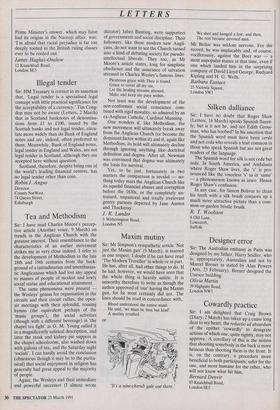Tea and Methodism
Sir: I have read Charles Moore's percep- tive article (Another voice, 9 March) on trends in the Anglican Church with the greatest interest. Their resemblance to the characteristics of an earlier movement strikes me as very close indeed. I refer to the development of Methodism in the late 18th and 19th centuries from the back- ground of a latitudinarian and unenthusias- tic Anglicanism which had lost any appeal to masses of people of modest and lowly social status and educational attainment. The same phenomena were present — the Wesleys' genius for organisation in the circuits and their circuit rallies, the open- air meetings with their splendid, rousing hymns (the equivalent perhaps of the 'music groups'), the social activities (though with a different beverage) in 'the chapel tea fight' as G. M. Young called it in a magnificently satirical description, and later the steak and kidney pie suppers in the chapel schoolroom, also washed down with gallons of tea, and the Saturday night 'socials'. I can hardly avoid the conclusion (obnoxious though it may be to the purita- nical) that social enjoyment in religion has generally had great appeal to the majority of people. Again, the Wesleys and their immediate and powerful successor (I almost wrote dictator) Jabez Bunting, were supporters of governments and social discipline. Their followers, like these modern new Angli- cans, do not want to see the Church turned into a kind of debating society for pseudo- intellectual liberals. They too, as Mr Moore's article states, long for simplistic obedience and the assurance of salvation stressed in Charles Wesley's famous lines:
Plenteous grace with Thee is found, Grace to cover all my sin, Let the healing streams abound, Make and keep me pure within.
Not least was the development of the non-conformist social conscience com- bined with rigid morality, so admired by an ex-Anglican Catholic, Cardinal Manning. One wonders if, like Methodism, the new movement will ultimately break away from the Anglican Church (or become the dominant factor within it) and if, again like Methodism, its hold will ultimately decline through ignoring anything like, doctrinal definition and dogma. After all, Newman was convinced that dogma was ultimately the basis for survival.
Yet, to be just, fortunately in two matters the comparison is invalid — no- thing today mars the Anglican Church like its squalid financial abuses and corruption before the 1830s, or the completely un- trained, unpastoral and totally irrelevant gentry parsons depicted by Jane Austen and Thackeray.
J. R. Lander
5 Witherington Road, London N5


























































 Previous page
Previous page